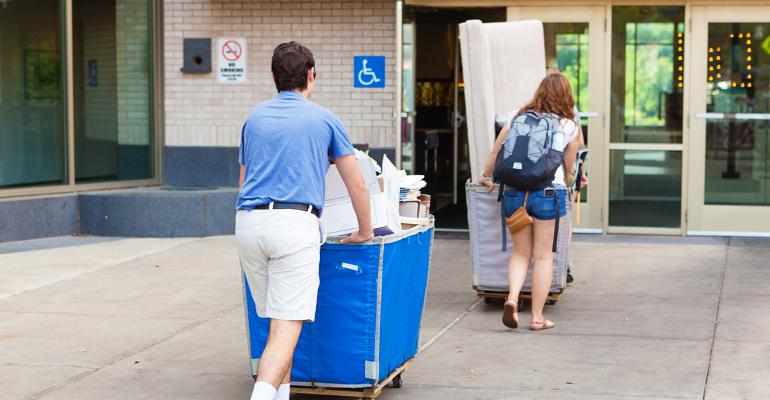(Bloomberg)—Colleges all across America are betting big on the resurrection of American campus life. So are bondholders.
After a year of declining enrollment, online classes and vacant quads, schools have started selling bonds again for new dormitories, signaling optimism that the impact of the pandemic will be short-lived.
Tufts University, a private school near Boston, took on $250 million of debt to build a new residence hall to allow more students to live on campus. Stockton University raised money to build apartments for its Atlantic City campus. Even a company that has seen several of its dorm projects fall into financial distress during the pandemic was easily able to sell bonds to build another at a college in Boca Raton, Florida.
They are joining other industries upended by Covid-19 -- like airports and convention centers -- that are seizing on low interest rates and investors’ confidence in the economic recovery to refinance debt or borrow for new projects. Investors have been anticipating a comeback even for schools struggling before the pandemic: Junk-rated education debt has returned more than 5%, some of the municipal market’s biggest gains.
“The higher-education sector has been far more resilient than people had thought back when the pandemic first broke in March and April,” said Eric Friedland, director of municipal research for Lord Abbett, which has been buying higher-education bonds.
Virtually Unscathed
The impact of the pandemic, which cut undergraduate enrollment nationwide by about 6% this spring, was softened by stimulus money from the federal government. That’s left bondholders virtually unscathed: debt issues for just 18 student-housing projects have showed signs of distress in 2020 and so far in 2021, either by defaulting or taking steps such as drawing down reserve funds to cover bond payments, according to Municipal Market Analytics.
The steady vaccination rollout is now promising a return to normal, with colleges poised to reopen classrooms and some confident enough to start borrowing again to build new facilities to draw in students. About $600 million of municipal bonds have been issued so far this year for student housing projects, nearly three times as much as was sold in the same period a year ago, according to data compiled by Bloomberg. A California agency this month will sell $275 million of bonds for a 613-unit student housing facility at the University of California, Davis.
Rhodes College, a liberal-arts school in Memphis, Tennessee, is among the schools financing new residences. The college of more than 1,800 students saw applications for the 2021-22 academic year surge to 20% over its previous record. It sold about $19 million of bonds in April for a new dormitory with a lounge for student groups to gather.
President Marjorie Hass said the pandemic has underscored the value of on-campus community. Rhodes has started requiring students to live on campus for three years -- instead of the previous two -- a step that will increase revenue by about $500,000 a year starting in fiscal 2023.
“We certainly have had to spend more time thinking about the campus experience,” she said in an interview. “It was really a moment to reflect on the value of the face-to-face residential experience.”
Encouraging Signs
There are other encouraging signs for schools. Students on average applied to 9% more colleges as of March 1 compared with last year, according to data from the Common Application, a nonprofit that lets individuals apply to multiple schools. Some of that may be driven by students sending more applications after many schools dropped requirements for students to submit SAT and ACT scores. Nationally, in April the amount of student housing pre-leased for the coming school year grew by 10 percentage points to about 58%, the biggest jump since prior to the pandemic, according to data on off-campus properties tracked by RealPage.
Tufts, a selective school in Massachusetts, saw undergraduate applications surge 35% for the fall 2021 semester. Last month, it sold $250 million of taxable bonds as part of a long-running plan to build a new residence hall on campus.
Michael Howard, an executive vice president at Tufts, said in a statement the school has been looking to add a new residence hall for years. “Although the proposed new dorm is unrelated to the pandemic, the challenges of the past year have given students an even greater appreciation for the sense of community that is fostered by residential campus life,” he said.
With investors pouring into high-yield bonds, even speculative projects are easily financed in the debt market. A private company affiliated with Provident Resources Group, a national company that finances dorms, sold bonds for a new 342-bed dorm at Lynn University, a private college in Boca Raton, Florida, with over 3,200 students. Other Provident properties have struggled during the pandemic, with two bond-financed projects in New Jersey disclosing in April that they would begin discussions with their bond trustee to avoid a technical default.
Investors demanded higher yields to be compensated for the risks associated with the Lynn sale. The bonds priced to yield 5% in 2057, about 3.4 percentage points above AAA borrowers.
Stockton University, a public college in Galloway Township, New Jersey, is expecting its campus to fill with students again. The number of residential students tumbled by 39% in fall 2020 as classes went online. This month, it sold bonds to finance a $69 million apartment-style complex that will house more than 400 students at its beach-front campus in Atlantic City that opened in 2018.
“Students are very interested in returning to a sense of normalcy,” said Jennifer Potter, chief financial officer at the university, in an emailed statement.
--With assistance from Janet Lorin, Natalia Lenkiewicz and Danielle Moran.
© 2021 Bloomberg L.P.




